Essential books for international students studying in the U.S.
Are you an international student preparing for your exciting journey to study in the United States? We’re here to help. In fact, we’ve compiled a comprehensive list of essential books for international students studying in the U.S. to guide you through every aspect of your study abroad adventure. From understanding American culture to improving your English language skills, these books will provide invaluable insights and advice to ensure your success in the U.S.
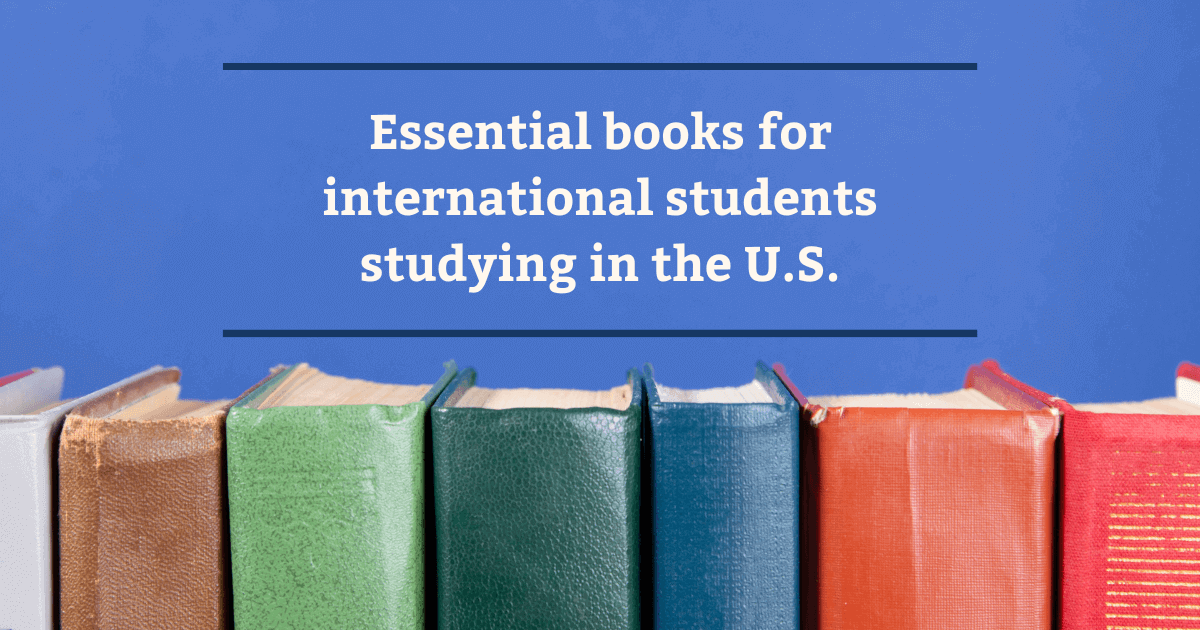
Table of contents
- Studying in the U.S.
- Personal development
- English language skills
- Stories about international students
- Practical aspects of studying in the U.S.
- American cities and regions
Books to prepare for studying in the U.S.
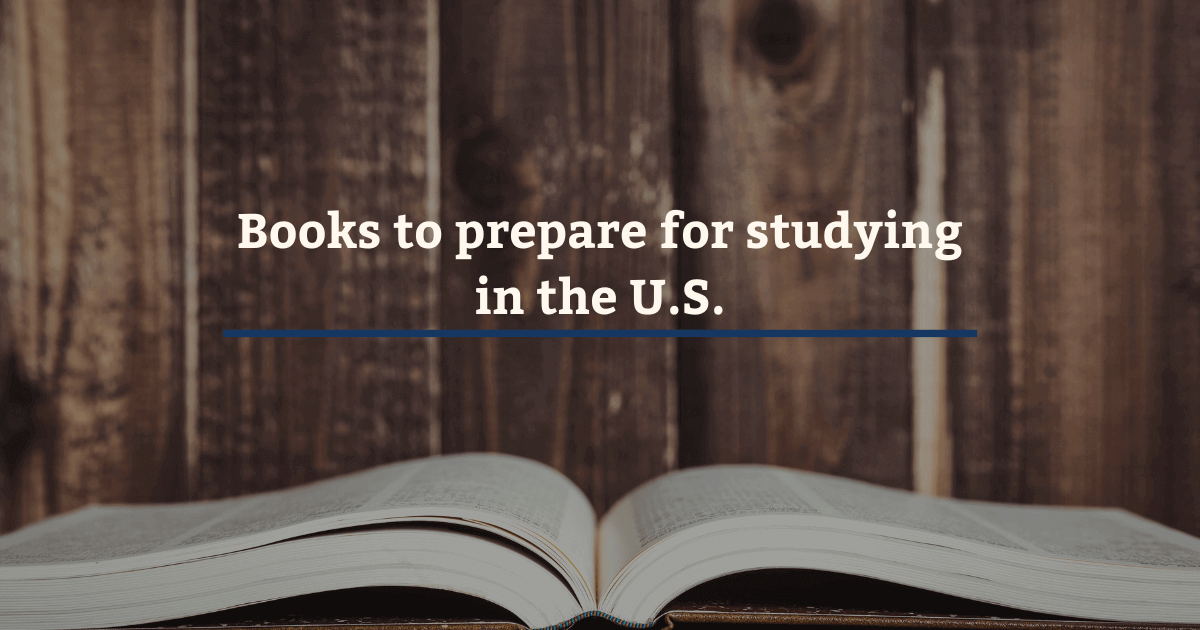
Embarking on the study abroad journey can be both exhilarating and challenging for international students. A good book can do wonders in providing you with the knowledge and perspective needed to thrive in your new environment.
Understanding American culture
Grasping American culture is crucial for international students to adapt more easily to the school environment and social life. A fantastic book to start with is “American Ways: A Cultural Guide to the United States” by Gary Althen, Amanda R. Doran, and Susan J. Szmania, who offer a comprehensive look at the values and customs of the U.S.
Another interesting read is “American Cultural Patterns: A Cross-Cultural Perspective” by Edward C. Stewart and Milton J. Bennett. This book is considered a seminal classic in the field of intercultural relations.
Navigating the U.S. education system
The U.S. education system may differ significantly from what you’re used to in your home country. An understanding of the academic expectations, grading system and classroom etiquette is key to excelling in your studies.
“The International Student Handbook” by Hayo Reinders, Nick Moore and Marilyn Lewis, offers a wealth of information on academic programs, application processes and financial aid.
Student life in the U.S.
Adjusting to student life in the U.S. can be an enriching experience, filled with incredible opportunities for personal growth and lifelong friendships.
To make the most of your time in the U.S., we recommend reading books like:
- “The Naked Roommate: And 107 Other Issues You Might Run Into in College” by Harlan Cohen
- “The College Experience” by Amy Baldwin
These books offer invaluable advice on navigating social activities, using campus resources and making friends. Using these resources puts you on a path toward creating unforgettable memories and forming lifelong connections during your study abroad journey.
Books on personal development
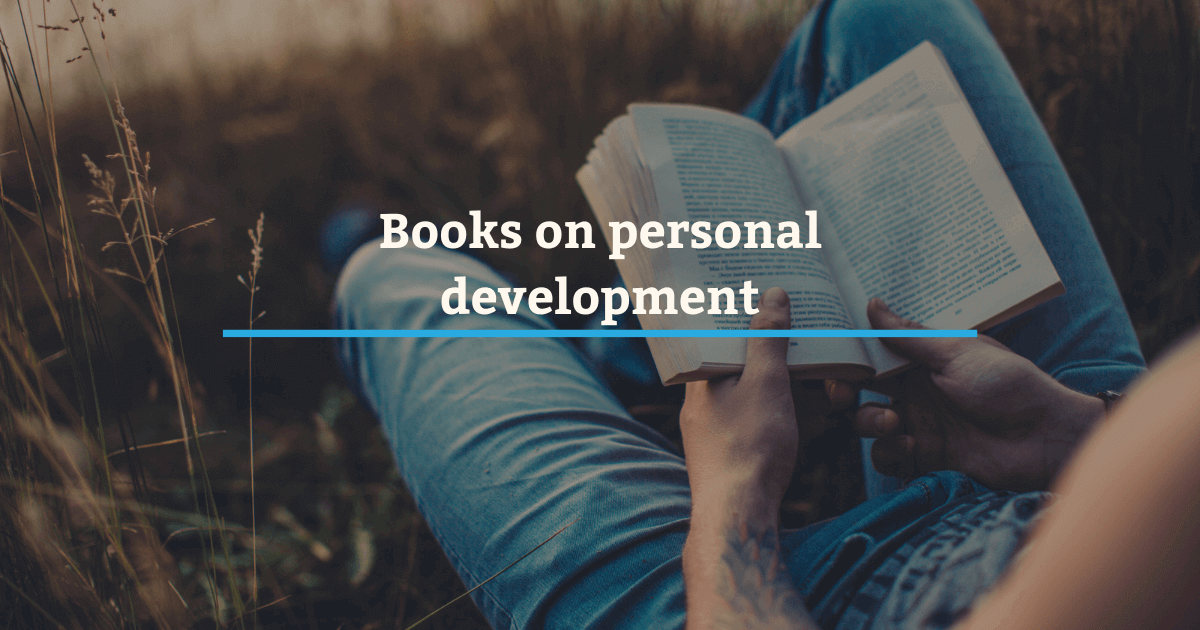
Personal development is a crucial aspect of any international student’s journey, as it encompasses essential skills such as communication, emotional well-being and time management. Developing these areas of personal growth can help you handle the challenges of studying abroad and excel academically.
Some excellent books to better equip you to develop these skills include:
- “The Time Paradox” by Philip Zimbardo.
- “The Power of Now” by Eckhart Tolle.
- “How to Win Friends and Influence People” by Dale Carnegie.
- “The 7 Habits of Highly Effective People” by Stephen Covey.
Time management and study skills
Effective time management and study skills are crucial for academic success in the U.S.
To hone these essential skills, we recommend books like:
- “Getting Things Done” by David Allen.
- “Eat That Frog!” by Brian Tracy.
- “The Pomodoro Technique” by Francesco Cirillo.
These books provide practical tips and strategies to help you stay organized, prioritize tasks and develop efficient study habits. Mastering time management and study skills prepares you to tackle challenging coursework and excel academically in the U.S.
Communication and networking
Building strong communication and networking skills is vital for fostering relationships and professional connections during your time in the U.S.
To improve these skills, consider reading books like:
- “Communication Skills for International Students” by Audrey Zenner.
- “Fundamentals of Communications and Networking” by Michael Solomon.
These books offer guidance on effective communication strategies, making a positive impression and building lasting connections with peers and professionals in your field. Enhancing your communication and networking skills positions you for success in both your academic and professional pursuits.
Emotional well-being and resilience
Coping with the challenges of studying abroad requires emotional well-being and resilience.
For emotional well-being, consider reading:
- “The Happiness Project” by Gretchen Rubin.
- “The Power of Positive Thinking” by Norman Vincent Peale.
These books provide practical insights and experiences to help you manage emotions, build relationships and maintain a positive outlook throughout your study abroad journey. Focusing on emotional well-being and resilience equips you to handle the ups and downs of your international student experience.
Books to improve English language skills
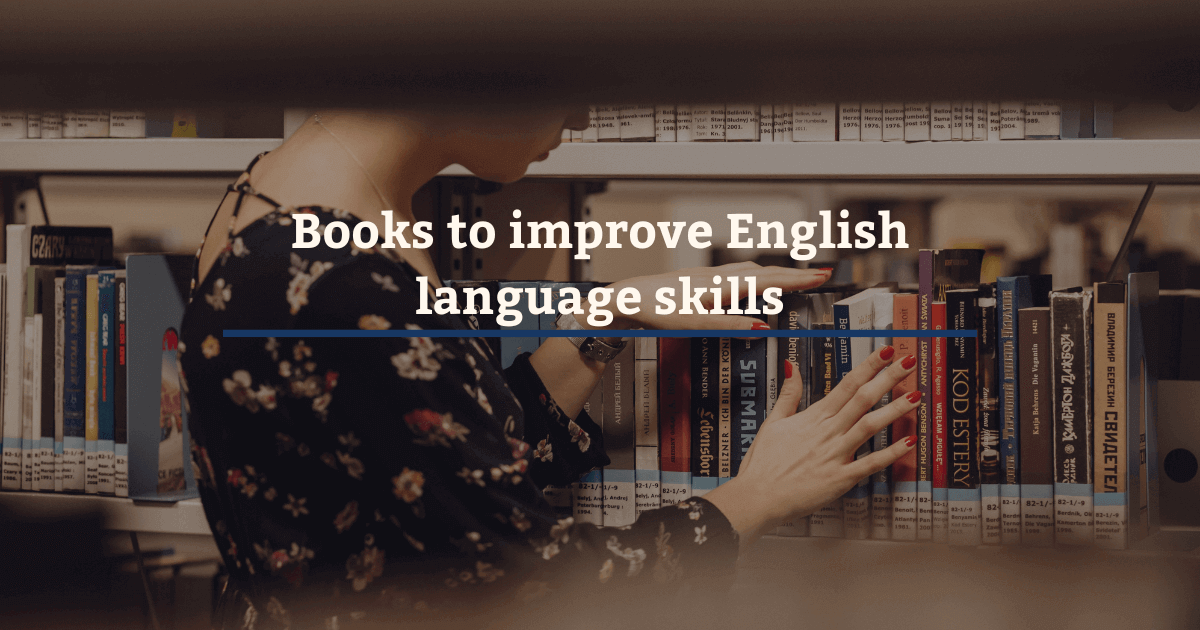
As an international student, improving your English language skills is essential for success in the U.S. Whether you’re a beginner or an advanced learner, there is a wide range of books available to help you enhance your:
- Grammar.
- Vocabulary.
- Academic writing.
- Listening and speaking skills.
Some popular titles include:
- “The Blue Book of Grammar and Punctuation” by Lester Kaufman and Jane Straus.
- “English Short Stories for Beginners and Intermediate Learners” by Language Guru.
- “English Grammar: 100 Tragically Common Mistakes (and How to Correct Them)” by Sean Williams.
- “A Moveable Feast” by Ernest Hemingway.
- “The Best Grammar Workbook Ever!” by Arlene Miller.
These books include traditional “learning” books as well as literature titles to enable vocabulary expansion, grammar practice and overall language improvement.
Immersing yourself in these engaging reads sets you on the path to mastering the English language and thriving in your studies in the U.S.
Let’s look in a little more detail at some specific skills in the following sections.
Grammar and vocabulary
A strong foundation in grammar and vocabulary is crucial for effective communication in the U.S. Books like “English Grammar in Use” by Raymond Murphy and “Word Power Made Easy” by Norman Lewis provide comprehensive explanations and exercises to help you improve your grammar and expand your vocabulary.
Dedicating time to mastering grammar and vocabulary prepares you to engage in conversations, understand lectures and participate in class discussions during your study abroad experience.
Academic writing
Academic writing can be a daunting task for international students, as it requires a deep understanding of the expectations and conventions of U.S. universities.
To help you improve your academic writing skills, we recommend books like:
- “Academic Writing: A Handbook for International Students” by Stephen Bailey.
- “They Say/I Say: The Moves That Matter in Academic Writing” by Gerald Graff and Cathy Birkenstein.
These books provide guidance on crafting well-structured essays, incorporating evidence and developing a clear and persuasive argument. Honing your academic writing skills equips you to meet the expectations of your professors and excel in your coursework.
You should also check our dedicated essay writing section for valuable tips!
Listening and speaking
Improving your listening and speaking skills is essential for understanding lectures and participating in class discussions in the U.S. To enhance these skills consider reading books like “I Know English, But I Can't Speak” by Kevin Peterson and “A Handbook of Spoken Grammar” By Ken Paterson, Caroline Caygill and Rebecca Sewell. These books offer exercises and activities to help you improve your pronunciation, as well as tips on using listening strategies to better understand lectures and conversations.
Working on your listening and speaking skills prepares you to engage in meaningful academic discussions and forge strong connections with your peers and professors.
Inspirational stories of international students
Studying abroad is a transformative experience filled with challenges and triumphs. By reading inspirational stories of international students who have overcome obstacles, adapted to new cultures and achieved their dreams, you can gain valuable insights and motivation for your own journey.
One such story, “On Beauty” by Zadie Smith, is a testament to the determination and success of international students studying in the U.S., inspiring you to embrace the challenges and opportunities ahead.
Overcoming challenges
The journey of international students is filled with challenges and obstacles to overcome. Reading books that share their stories can be an incredible source of inspiration and motivation. Titles like “Losing North” by Nancy Huston and “The Foreign Student” by Susan Choi offer compelling narratives of international students who have faced adversity and triumphed.
Immersing yourself in these stories provides valuable insights into the resilience and determination required to succeed in your study abroad experience.
Cultural exchange and adaptation
Cultural exchange and adaptation play a crucial role in a successful study abroad experience. Books like “The Namesake” by Jhumpa Lahiri delve into the experiences of migrants as they navigate new cultures and environments.
Stories like this highlight the importance of embracing cultural differences and adapting to new surroundings, providing valuable insights and inspiration for your own journey in the U.S.Pursuing dreams and achievements
International students often embark on their study abroad journey with dreams and aspirations to achieve. Books like “The International Advantage: Get Noticed. Get Hired!” by Marcelo Barros and “Power Ties (The International Student's Guide to Finding a Job in the United States)” by Dan Beaudry showcase the achievements and dreams of international students, inspiring you to pursue your own goals and ambitions.
These books encourage you to seize opportunities, overcome challenges and stay focused on your dreams and achievements throughout your study abroad experience.
Books on practical aspects of studying in the U.S.
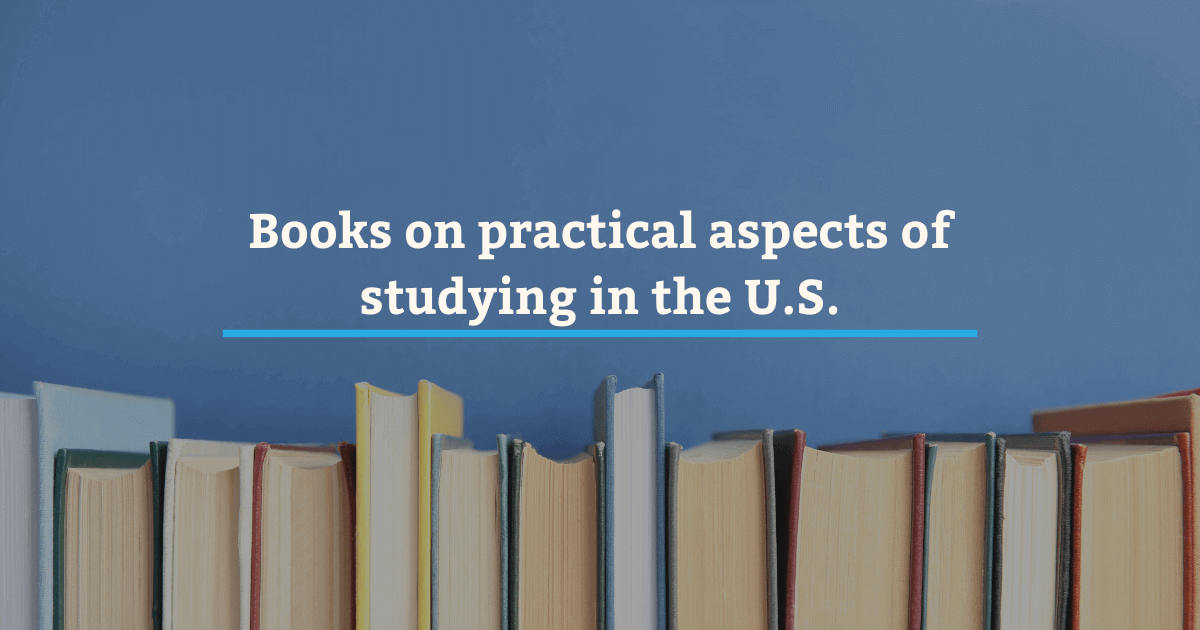
In addition to culture and academics, there are also practical considerations to keep in mind when studying in the U.S. These include a visa and immigration, housing and financial aid. Reading books that cover these practical aspects,will help prepare you to navigate the logistics of studying abroad and ensure a smooth transition to life in the U.S.
Some recommended books for practical aspects include:
- “Visa Solutions for International Students, Scholars, and Sponsors” by Lisa N. Ellis.
- “U.S. Immigration Made Easy” by Ilona Bray and Kyle A. Knapp.
- “The International Student’s Guide to American Colleges” by Pallas Snider.
These books provide invaluable insights and advice on various aspects of studying in the U.S., allowing you to focus on your academic and personal growth during your study abroad journey.
Scholarships and financial aid
Scholarships and financial aid can play a significant role in easing the financial burden of studying abroad. To explore the various scholarships and financial aid opportunities available to international students, we recommend books like “The Ultimate Scholarship Book” by Gen Tanabe and Kelly Tanabe, and “The International Scholarship Book” by Daniel J. Cassidy.
These books detail various financial assistance options, helping you find the support you need to make your study abroad dreams a reality.
Books about American cities and regions
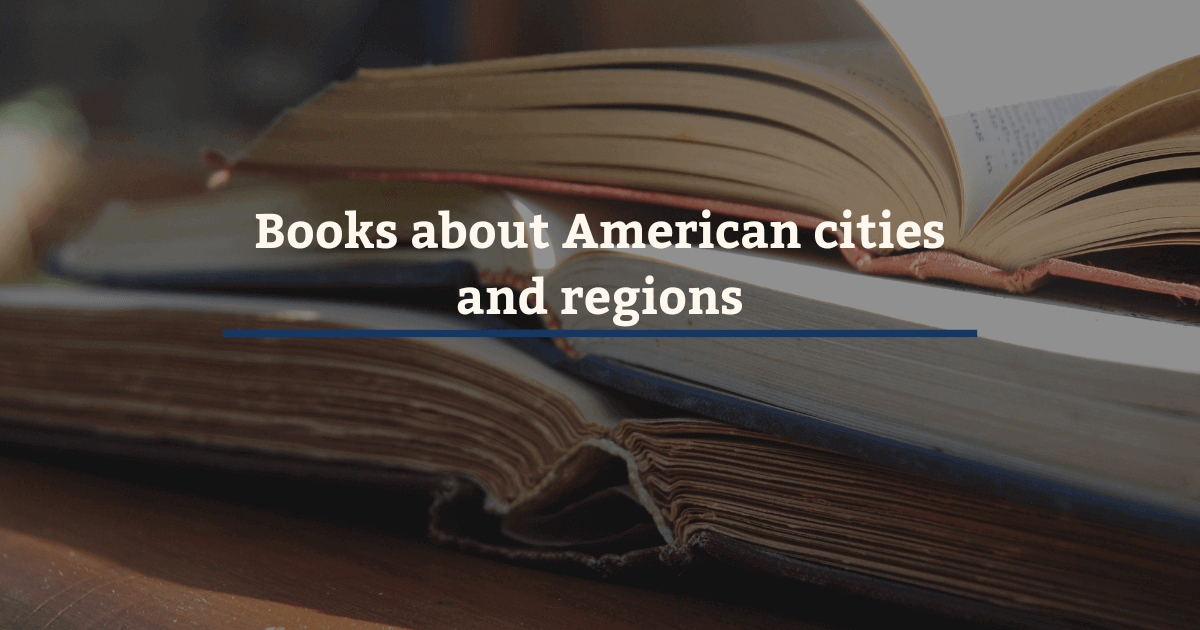
Exploring American cities and regions is an exciting aspect of studying in the U.S. By reading books that introduce you to the diverse landscapes and urban life of America, you’ll gain a deeper appreciation for the country and its many attractions.
Some fantastic books to help you explore American cities and regions include:
- “Abroad at Home” by National Geographic.
- “Lonely Planet Guides” for specific cities and regions.
Gain invaluable insights and recommendations for your travels with these titles, encouraging you to experience the diversity and beauty of the U.S. during your study abroad journey.
Major college towns
To get a glimpse of life in major college towns in the U.S., consider reading “The American College Town” by Blake Gumprecht, which identifies the distinguishing features of college towns and explains why they are unique urban places shaped by youth, intellect and idealism.
Discovering America's natural wonders
The U.S. is home to an array of breathtaking natural wonders, offering international students the opportunity to explore the country’s diverse landscapes. Books like National Geographic’s “Guide to America’s Hidden Corners” and “America’s Great Hiking Trails” by Karen Berger explore the stunning beauty of America’s natural attractions.
These books, showcasing everything from picturesque national parks to awe-inspiring mountain ranges, inspire exploration beyond the beaten path to discover the incredible natural wonders the U.S. has to offer.
Summary
In conclusion, our comprehensive list of essential books for international students covers a wide range of topics, from understanding American culture to practical aspects of studying in the U.S. These books not only provide invaluable insights and advice for a successful study abroad experience, but also inspire and motivate you to embrace the challenges and opportunities that lie ahead. By investing time in reading these insightful books, you’ll be well prepared to make the most of your study abroad journey and create unforgettable memories in the United States.
